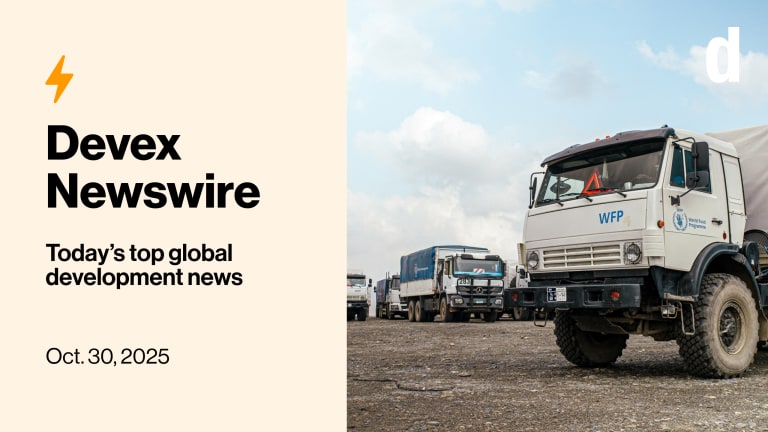
BRUSSELS — The European Union enjoys significant “political leverage” in Ethiopia thanks to hundreds of millions of euros of development spending, an official from the bloc’s executive told lawmakers Thursday, apparently suggesting the aid budget could be used to influence the current situation.
As the conflict between the federal government and forces in the northern Tigray region continues, the foreign affairs and development committees of the European Parliament met Thursday to assess the EU’s response.
Tensions in Ethiopia could lead to widespread displacement, access issues
Violence in Ethiopia has limited the ability of aid groups to operate. These organizations have raised concerns about the violence leading to widespread displacement and inhibiting access to services.
Hans Stausboll, head of unit for Eastern Africa, Horn of Africa at the European Commission’s development department, told the committees that Ethiopia has an envelope of €815 million ($966 million) for the 2014-2020 budgetary period, plus more than €400 million from the EU Trust Fund for Africa, as well as money received through thematic programs.
Stausboll said that support means “the relationship we have with Ethiopia is extremely substantial and that we use our programs to further our political objectives, that goes without saying.”
Much of the bloc’s assistance comes in the form of budget support, channelled through the government. However, Stausboll said no decision had been made on whether to grant €90 million in payments expected to be requested before the end of the year. He added that the EU institutions were keen to coordinate with member states, many of whom also provide budget support.
“I would ... not underestimate the political leverage we have collectively, the EU and the member states, when it comes to using in the appropriate way the financial cooperation in order to support our political goals,” Stausboll said.
“A number of our programs are actually supporting very directly the most poor people in Ethiopia. And we are in contact with our member states, we are in contact with the World Bank who is considering a major budget support operation for Ethiopia, in order to assess how can we use in the most appropriate way the financial cooperation, obviously without penalizing the people that we set out to help.”
But not everybody agrees that such leverage exists, or that it would be wise to attempt to wield it. According to an official from a humanitarian organization working in Ethiopia, who spoke anonymously, donors have limited influence over the political situation. The official noted that the Ethiopian government has alliances with other wealthy nations including China and the Gulf countries, which are less likely to interfere, and that it also has important regional influence.
It is also unclear whether there will be any pressure from countries like the United States, the official said. Ethiopia plays a significant role in global efforts to combat terrorism with its troops in neighboring Somalia and is a partner in other areas, such as migration.
“The U.S. doesn't want to suddenly find themselves in a situation where Ethiopia says: ‘You criticize us, we pull out of Somalia, and you watch al Shabab takeover,’” the official said.
In a press briefing Thursday, Tibor Nagy, assistant secretary for the Bureau of African Affairs at the U.S. State Department, said it was not the job of the U.S. to stop the fighting but of the two parties involved.
Lidet Tadesse Shiferaw, a policy officer at the ECDPM think tank, added that the Ethiopian government was likely to see the EU removing budget support as “taking sides and that would have damaging consequences for the EU's relationship with the government,” as happened after the 2005 election crisis.
While the EU could use its good relationship with the government to pressure it on issues such as humanitarian corridors, ethnic profiling and meeting the needs of refugees from the conflict, “the EU would have to play this very carefully. In my opinion, threatening to withdraw funds is going to send the wrong message; the Ethiopian government (regardless of the administration) does not respond well to arm twisting. In fact, it often backfires on whoever attempts it,” Shiferaw wrote in an email.
The conflict began on Nov. 4, when Ethiopian Prime Minister Abiy Ahmed ordered military action against the Tigray People’s Liberation Front, the ruling party in Tigray, accusing it of having attacked a federal military base, which it denies.
Last week, the EU’s foreign affairs chief and humanitarian commissioner — both of whom were in Addis Ababa last month — issued a statement, saying that, “Ethnically targeted measures, hate speech and allegations of atrocities occurring in Ethiopia are deeply worrying” and urging immediate deescalation of the conflict to avert a “major humanitarian crisis.”
Dominique Albert, head of the unit for Eastern and Southern Africa at the commission’s humanitarian department, ECHO, said that even before the current crisis, 3 million people in Tigray required assistance, adding that these people are now cut off from help.
Albert said access was being hampered by road closures, blackouts, lack of fuel, and the evacuation of humanitarian staff.
She said between 150,000 and 200,000 people were now internally displaced, while more than 30,000 refugees fleeing the fighting in Tigray have reached Sudan. The commission announced €4 million Thursday to support those refugees.
“UNHCR and Sudan authorities were planning for 20,000 refugees,” Albert told the committees, “and we have now more than 30,000.” On Friday, the UN Refugee Agency said it expected 200,000 Ethiopian refugees to arrive in Sudan over the next six months.
Update, Nov. 23: This story was amended to clarify that Ethiopia has an envelope of €815 million for the EU’s 2014-2020 budgetary period.









